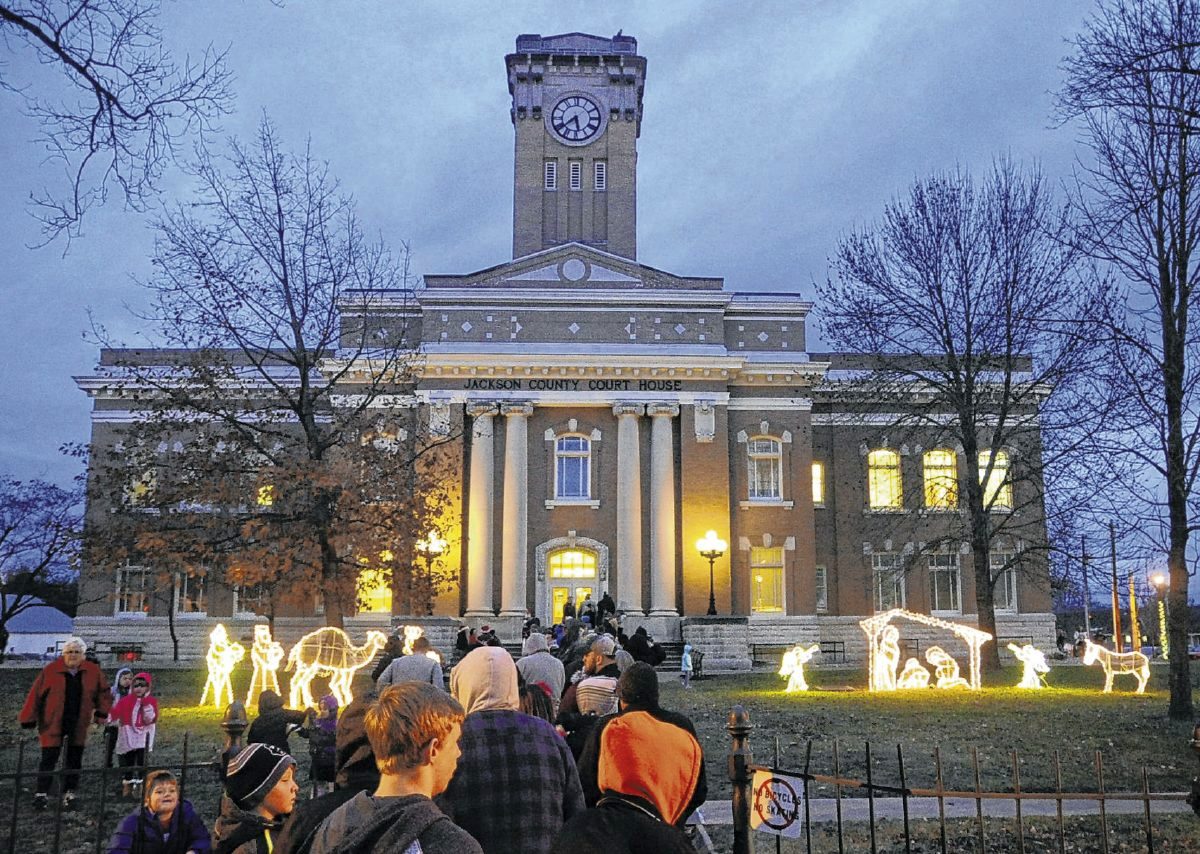
A federal judge recently ruled a Nativity scene displayed on the Jackson County Courthouse lawn in Brownstown during the holidays each year cannot be displayed.
The ruling stems from a lawsuit filed Dec. 28, 2018, in the New Albany division of the Southern District of Indiana, U.S. District Court.
That suit, filed by Rebecca Woodring of Seymour, asked the court to rule the Nativity scene violated her civil rights as she felt county government was promoting Christianity to her and other county residents. According to court records, Woodring is an atheist and believes government should not be involved in religious activity.
U.S. District Court Judge Tanya Walton Pratt issued the ruling supporting Woodring’s contention Friday.
In her ruling, Pratt said the display needed to be removed from future display on the courthouse lawn.
“Jackson County has violated the rights of Woodring and its other citizens by displaying a religious symbol on government property in violation of the First Amendment,” Pratt said in her ruling. “Jackson County is hereby enjoined from displaying the crèche as presently presented on the lawn of the historical courthouse.”
Woodring, represented by attorney Kenneth J. Falk with the American Civil Liberties Union of Indiana, said she was happy to learn the judge had ruled in her favor.
“This is a huge win for everyone who believes religion and government should be separated,” she said.
County Commissioner Bob Gillaspy, who spoke at a rally supporting the Nativity scene Dec. 22, 2018, at the courthouse, said he was deeply disappointed with the ruling.
“Commissioners will be meeting with our legal counsel to discuss our next step,” he said.
Commissioners President Matt Reedy, who also has expressed support for the display in the past, said he expects it to be a topic during the next commissioners meeting. That meeting is at 6 p.m. today at the courthouse.
“But at this time, I haven’t seen a copy of the ruling nor do I know what part the judge ruled on already,” Reedy said.
The Nativity scene is owned by the Brownstown Ministerial Association and cared for by the Brownstown Lions Club. It has appeared on the courthouse lawn nearly every holiday season since 2003.
After Woodring’s lawsuit was filed, other nonreligious holiday figures, such as Santa Claus and carolers, were moved near the Nativity scene to show the display did not promote a particular religion over others and was meant to celebrate Christmas.
The county then asked Pratt to dismiss Woodring’s complaint in October 2019 contending she had not suffered any damages and making the Nativity scene part of an overall holiday display was constitutional. The judge dismissed that motion, stating the display of the Nativity scene continues to give the impression of a religious endorsement.
Woodring said in her suit she had to pass the Nativity scene often for her work duties, which includes T-shirts she has printed to be delivered in the Brownstown area.
She also claimed she had to use a nearby county office for part of ongoing divorce proceedings and collection of child support payments.
Because of those activities, she would either have to be forced to view the display or considerably alter her behavior to avoid it, each of which could cause her to suffer psychological injury.
The county, defended by the Liberty Counsel of Maitland, Florida, free of charge, contended Woodring had no necessary business that forced her to visit the courthouse.
The county also claimed she could still participate fully as a citizen and fulfill her legal obligations while avoiding the display since everything associated with her divorce was done in the county’s new judicial center. According to them, this would neglect the claims of possible psychological injury.
The court found Woodring would have to considerably alter her behavior to avoid it because of how close the judicial center is to the courthouse. This led to the ruling that the Nativity scene needed to be removed from the courthouse lawn.
Woodring did not seek further financial compensation, but the county will have to pay her attorney’s fees and other related fees. The ruling, however, can be appealed by the county and further challenged in court.
